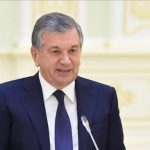
President Shavkat Mirziyoyev, who assumed office in 2016, has undertaken a robust endeavor to reshape Uzbekistan’s governance, energize civil society, foster political competition, address human rights issues, and cultivate a modern civic ethos in line with the nation’s status as a forward-looking regional power in Eurasia. Particularly noteworthy is the growing influence of the youth, constituting a significant majority, which amplifies the significance of these ongoing transformations, potentially transcending the impact of three decades of history.
Economic Reforms and Initiatives Driving Uzbekistan’s Growth
Mirziyoyev’s transformational journey traces back to his appointment as Prime Minister in 2003, during which he discreetly diversified national political discourse and acknowledged obstacles hindering Uzbekistan’s progress as an emerging twenty-first-century power. The innovative initiatives launched by the President Mirziyoyev hold the potential to reshape internal politics, redefine the citizen-state relationship, and restore equilibrium to a region historically influenced by external major powers.
In the lead-up to the 2016 Presidential elections, Mirziyoyev campaigned for a transparent and open government that truly serves its people, an unprecedented concept in the history of post-Soviet Uzbekistan. Anchoring his vision, the president introduced key documents that outline transformative reforms. These documents include a Judicial and Legal System Reform Program, an Action Strategy for 2017-2021 focused on enhancing the rule of law and the social sector, and an Administrative Reform Concept aimed at creating an efficient public administration system. These frameworks aim to elevate civic advocacy groups like Mahallas to government partners, bolster economic competitiveness, and combat corruption.
Major transitions in Uzbekistan in the positive leadership of President Shavkat Mirziyoyev
- Economic Reforms: President Mirziyoyev implemented market-oriented economic reforms, attracting foreign investment and promoting entrepreneurship, leading to increased economic growth.
- Diplomatic Outreach: His administration actively engaged with neighboring countries, strengthening regional cooperation and improving diplomatic relations, contributing to stability in Central Asia.
- Investment in Education: Mirziyoyev’s government emphasized education, with initiatives to modernize the education system, enhance teacher training, and promote STEM education to prepare Uzbekistan’s workforce for the future.
- Technological Advancement: The president’s focus on technological innovation led to the growth of the IT sector, fostering startups, and expanding digital infrastructure to connect more citizens to the internet.
- Streamlined Bureaucracy: He undertook significant bureaucratic reforms, simplifying administrative procedures and reducing corruption, making it easier for businesses to operate and citizens to access government services.
- Tourism Development: The administration’s efforts to promote tourism led to the easing of visa requirements, preservation of cultural heritage sites, and marketing campaigns, boosting the country’s image as a tourist destination.
- Agricultural Reforms: Mirziyoyev introduced measures to modernize the agricultural sector, encouraging sustainable practices, improving irrigation systems, and increasing agricultural productivity.
- Human Rights Progress: While challenges remain, there have been notable improvements in human rights conditions, including the release of political prisoners and increased media freedoms.
- Social Welfare: The government implemented social welfare programs to support vulnerable populations, such as pension reforms, healthcare improvements, and poverty reduction initiatives.
- Infrastructure Development: Major infrastructure projects, including transportation networks and energy facilities, were launched to improve connectivity and energy security, supporting economic growth and regional integration.
Conclusion
Mirziyoyev’s tenure has heralded significant reforms in Uzbekistan’s political landscape, with constitutional changes in 2014 redistributing power between the parliament and the executive. Proposals for direct elections of governors and mayors, instead of presidential appointments, further exemplify his innovative approach. These efforts are set to continue, reshaping local and regional governance and necessitating vigilant oversight to ensure a focus on citizens’ welfare. President Mirziyoyev’s commitment to addressing corruption has led to tangible action, including the dismissal of officials and heightened accountability, promoting a more responsible government.
This transformative journey extends to Uzbekistan’s youth, with education and economic growth prioritized to equip the younger generation with skills and opportunities. While Mirziyoyev emphasizes tolerance and combating intolerance, the importance of a secular state with secular laws remains a focal point. His commitment to improving Uzbekistan’s global human rights image is evident through initiatives inviting international organizations and promoting transparency. Challenges ahead involve implementing local government reforms, ensuring transparency, conducting direct elections, fostering cooperation, and advancing democratization efforts. Navigating these challenges while embracing diverse opinions and political culture will be critical in shaping the nation’s future.











